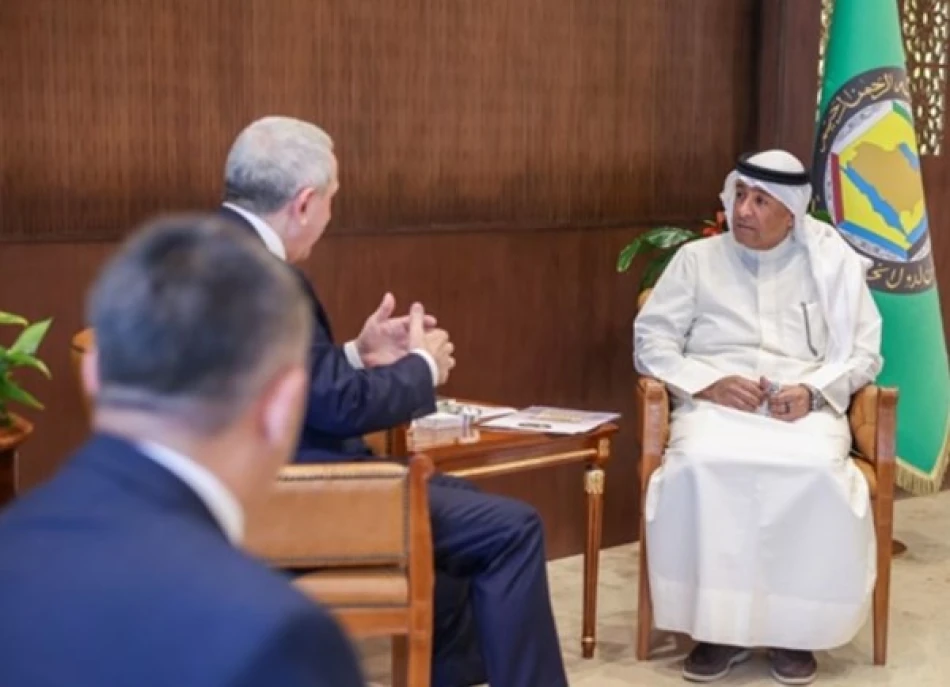
GCC and Azerbaijan Explore Implementing Joint Action Plan for Strengthened Cooperation
GCC-Azerbaijan Partnership Gains Momentum as Energy Cooperation Takes Center Stage
The Gulf Cooperation Council is accelerating its strategic partnership with Azerbaijan through a comprehensive five-year action plan, signaling the region's intent to diversify energy partnerships beyond traditional Western allies. The collaboration, formalized in November 2023, positions both sides to capitalize on shifting global energy dynamics and geopolitical realignments.
Strategic Dialogue Advances Regional Cooperation
GCC Secretary-General Jasim Mohammed Al-Budaiwi met with Azerbaijan's Ambassador to Saudi Arabia, Shahin Abdullayev, at the organization's Riyadh headquarters to review progress on their joint action plan spanning 2024-2028. The meeting underscored both sides' commitment to expanding cooperation across multiple strategic sectors.
The discussions covered political coordination, trade cooperation, investment opportunities, and energy collaboration—areas where both the Gulf states and Azerbaijan possess significant comparative advantages. Officials also exchanged views on current regional and international developments, reflecting the growing importance of South-South cooperation in an increasingly multipolar world.
Energy Synergies Drive Partnership Forward
Complementary Energy Profiles
The timing of this partnership reflects shrewd strategic calculation. Azerbaijan, with its substantial oil and gas reserves in the Caspian Sea, offers the GCC states valuable experience in energy diversification and pipeline infrastructure. Meanwhile, Gulf nations bring massive capital resources and advanced energy technologies, particularly in renewable energy sectors where countries like the UAE and Saudi Arabia are making significant investments.
Geopolitical Positioning
This cooperation gains additional significance amid global energy market volatility and changing geopolitical alignments. Azerbaijan's strategic location as an energy corridor between Europe and Asia complements the GCC's position as a global energy hub, potentially creating new transit routes and market opportunities that bypass traditional Western-dominated channels.
Investment and Trade Implications
For investors and multinational corporations, this partnership signals emerging opportunities in infrastructure development, energy technology transfer, and cross-regional trade facilitation. The GCC's sovereign wealth funds, collectively worth over $3 trillion, could find attractive investment targets in Azerbaijan's developing energy infrastructure and broader economic diversification efforts.
The partnership also reflects a broader trend among resource-rich nations to strengthen South-South cooperation, reducing dependence on Western financial systems and creating alternative economic networks. This mirrors similar initiatives by Gulf states with countries like India, China, and other emerging economies.
Regional Stability and Future Prospects
The emphasis on political coordination suggests both sides recognize the value of aligned positions on regional security issues. Azerbaijan's experience managing complex relationships with Russia, Iran, and Turkey could provide valuable insights for GCC states navigating their own regional challenges.
As global energy markets continue evolving toward greater diversification and regionalization, partnerships like this one between the GCC and Azerbaijan represent a pragmatic approach to ensuring energy security while building resilient economic relationships outside traditional Western frameworks. The success of this collaboration could serve as a model for similar partnerships across the developing world.
Most Viewed News

 Layla Al Mansoori
Layla Al Mansoori






